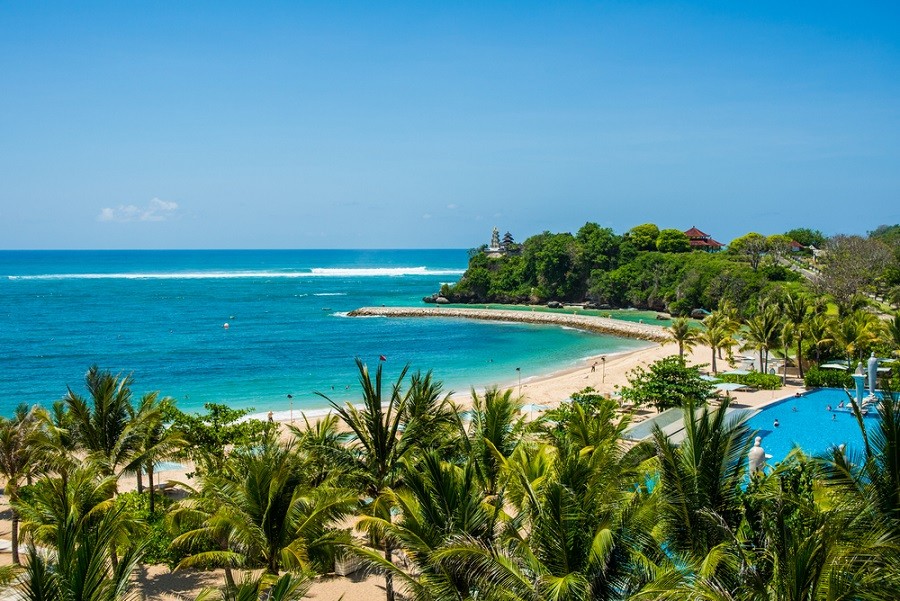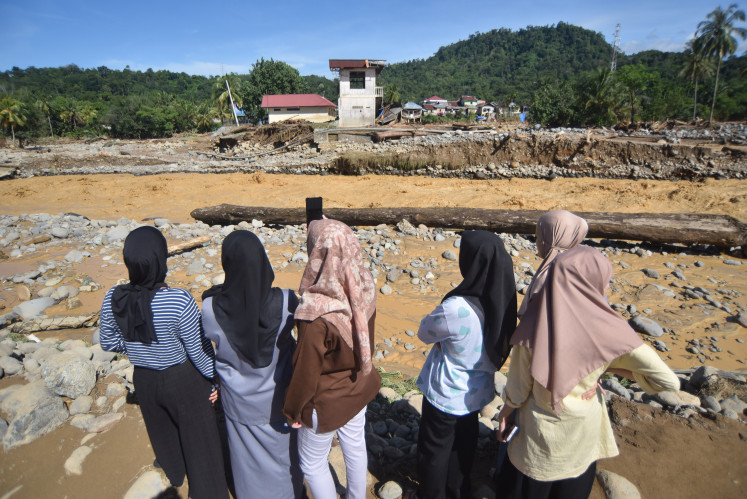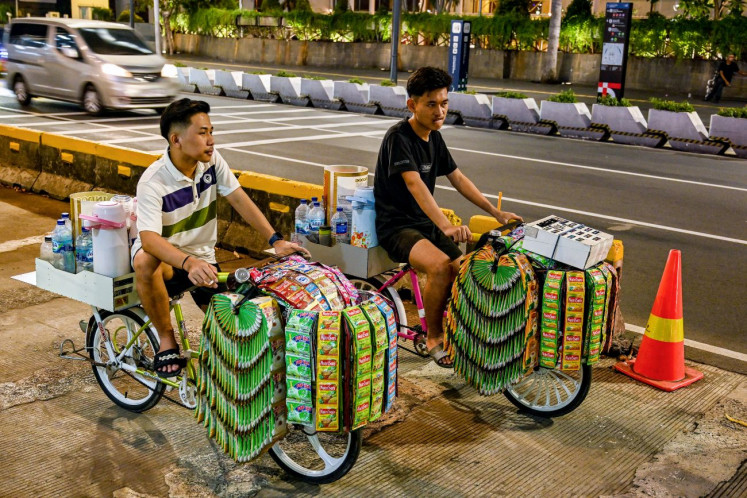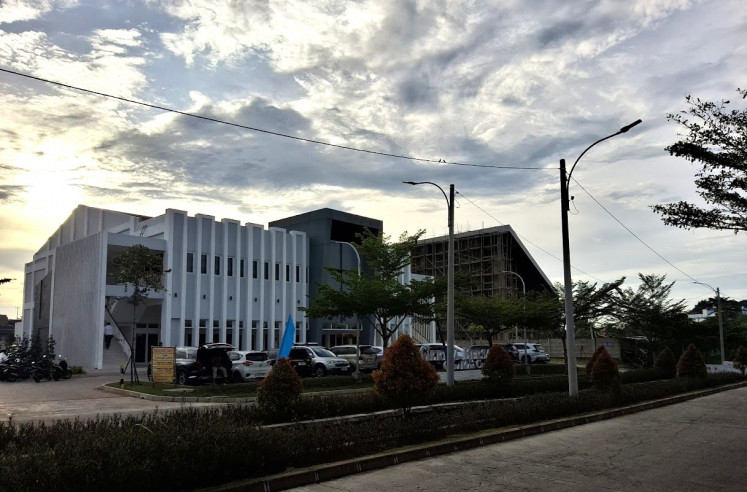Popular Reads
Top Results
Can't find what you're looking for?
View all search resultsPopular Reads
Top Results
Can't find what you're looking for?
View all search resultsHalal industry to benefit from IMF-WB Bali meeting
The government previously projected to earn more than US$100 million from the event.
Change text size
Gift Premium Articles
to Anyone
I
ndonesia is gearing up for the annual meeting of the International Monetary Fund and World Bank set to take place in Nusa Dua, Bali, in October this year.
More than 15,000 guests from 189 countries, including delegations from the Group of 20, Group of 24, Gulf Cooperation Council and Organization Islamic Cooperation (OIC) will take part in the meeting scheduled from Oct. 12 to Oct. 14.
The meeting will give Indonesia the opportunity to have our voice heard and demonstrate our progress as Southeast Asia's largest economy, as well as to bring in millions of dollars and attract more investors by highlighting our successful story as the fourth country in ASEAN to host the event.
The government previously projected to earn more than US$100 million from the event, which will see Indonesia make a profit of at least Rp 500 billion ($34.25 million). The government has set aside a budget of Rp 810 billion for the meeting.
To be a successful host, our government needs to deliver the best comprehensive services to create a luxury experience for guests, including those from Muslim-majority countries. Although this prestigious event will be held in Bali, it should still capture the national identity of Indonesia as the home for the biggest Muslim population globally. Therefore, the responsibility to make this event impressively successful is borne by all stakeholders at both the regional and national level.
The Tourism Ministry is upbeat that Indonesia has immense potential in developing halal tourism – a highly competitive and high-revenue market in recent years.
According to the 2017/2018 Global Islamic Economy Indicator, Indonesia ranks fourth in halal tourism, a leap from 10th place in the previous year. Thus, faith-compatible tourism should generate various multiplier effects in halal industry. Bali could learn from our neighboring country, Thailand, as a Muslim-minority country intensely promoting halal tourism.
The key to tapping into this prospective demand is to make available Muslim-friendly amenities, services and other tourism-related infrastructure, supported by clear and transparent communication. To achieve this, the global tourism industry must first overcome the challenge of understanding these requirements and mobilize the necessary investments in fulfilling them, which requires a coordinated response from all stakeholders.
One of the most crucial features to achieve the national target for attracting no less than 3.8 million Muslim visitors yearly are facilities that allow Muslim travelers to perform the five obligatory daily prayers, each of which must be performed within a specific window of time: pre-dawn, afternoon, evening, sunset and night-time.
In a country with a sizeable Muslim population like Indonesia, it is highly expected that Muslim guests will have comfortable and easily accessible spaces in public areas in which to pray, including meeting rooms, convention centers, airports, shopping complexes, and other tourist destinations. To adjust with non-majority regions, such spaces do not need to be reserved for the sole use of Muslims; they can be multi-faith prayer rooms. Such facilities should be clearly signposted and marked in the building directory.
Adhering to Islamic principles, there are several minimal requirements for a facility to be suitable for praying, such as cleanliness, the separation between men and women particularly in the wudhu (ablution) area and preferably an arrow pointing toward Mecca. The availability of prayer mats, a clock (to ascertain prayer times), women’s prayer robes and copies of the Quran could significantly improve the Muslim friendliness of the facility.
As one of its multiplier effects, the availability of Muslim-friendly accommodation will also boost the halal food industry. Providing easy access to halal food and beverage options is arguably the most important factor for Muslim guests. Particularly in this growing market segment, the Indonesian market is estimated to be worth around $10 billion annually with an annual growth of 7-10 percent, according to last year’s Global Islamic Finance Report.
Practically, Muslim-friendly tourism should provide halal food and beverages onsite, including the minibar (which requires alcoholic beverages and non-halal foodstuff to be replaced with halal substitutes) as well as breakfast and room service. If not readily available, it should offer Muslim guests the ability to pre-order a halal menu prior to arrival, similar to the way airlines allow passengers to request special meals catering to specific dietary requirements while making a flight booking. To complement the hotel’s own range of halal food and beverages, Muslim guests should also be provided with ample information on nearby halal restaurants.
Further, growth in halal industry has created more and more opportunities in the country as researchers note. Specifically related to halal tourism, human resources are critical as their awareness, understanding and skill are needed to ensure that Muslim travelers are able to fully experience the facilities and flexibilities introduced to cater to their preferences.
Rigorous training is particularly essential for personnel working in food preparation, given the need to understand the various requirements governing halal and haram ingredients and prevent accidental comingling between the two. As suggested by a researcher on halal tourism, A. Nurdiansyah, service personnel in tourist attractions should be familiar with common requirements of Muslim travelers such as the location of prayer facilities and halal food stores.
In the long run, digital offerings and accessible information are highly required to broaden the Muslim travel network in this borderless era. It is crucial to communicate the availability of Islamic provisions and facilities to visitors who ultimately allow the halal industry to boost economic growth sustainably. Having said this, the halal industry will certainly benefit from the upcoming high-level meeting in Bali.
***
The writer is a lecturer at the Islamic University of Indonesia, Yogyakarta.










